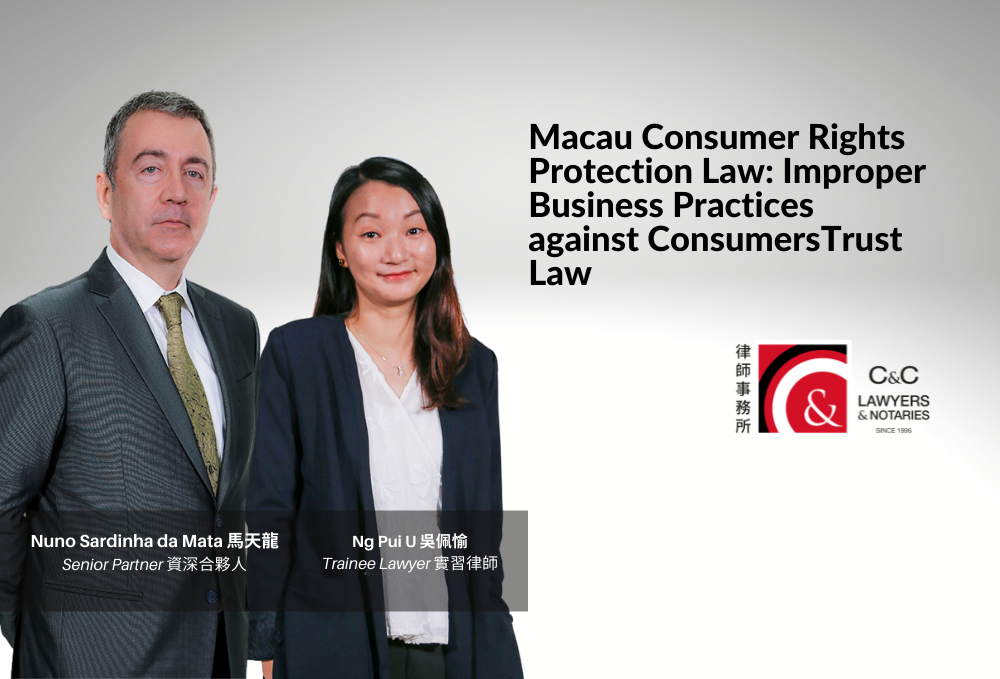
by: Nuno Sardinha da Mata, Senior Partner & Ng Pui U, Trainee Lawyer
The Macau Consumer Rights and Interests Protection Law (Law 09/2021) (CRPL) entered into force on January 1, 2022. Among the several features that the law brings to the defence of the consumers, the law foresees improper business practices against consumers.
“Unfair business practices” are defined as business practices that are not conducted professionally and that have the effect of either:
In general, the standards used to determine the legitimacy of a business are those of the average consumer. In the case of a specific consumer group, reference should be made to the standards of the general members of that group.
Improper business practices are expressly prohibited by law. If consumers become aware that they have been affected by improper business practice, they may initiate a court action on the contract entered into influenced by said practice. On the other hand, consumers may choose to follow the principles of fairness and apply for a revision of the contract, which may be limited to the non-valid clauses, with the remaining valid parts remaining.
The CRPL distinguishes and divides improper business practices into two major categories: misleading and aggressive.
Misleading Business Practices:
Misleading business practices disseminate false information about goods or services to consumers. Some examples of these are spreading false representations of special or reduced prices, misrepresentations about the sales’ legality or the risks of not purchasing the good of services, exaggerated features, false claims about their period of availability, false certifications of food safety or consumer confidence.
Misleading business practices may also occur when marketing goods or services. Some examples are claiming that a celebrity or public figure has obtained them, suggesting a specific price but then refusing to provide said goods or services with the intent of selling different ones or falsely promoting items as being from a particular manufacturer.
It is worth noting that operators often promote goods or services through training or educational activities. However, failure to provide advance notice to consumers of the timing of such promotions is considered a misleading business practice.
In addition, inappropriate behaviour when providing quotations with ambiguous descriptions or demanding fees for products or services said to be free or gifted also constitutes misleading business practices. For example, an operator may offer a vague quote to consumers, initially state that they will not charge for the relevant goods or services, or advertise that it will give away additional items but then require consumers to pay for them.
Aggressive Business Practices:
Aggressive business practices are those in which the operator acts in a way that creates a negative impression of the consumer, reaches out to the consumer in an inappropriate manner, and makes particular demands to dissuade the consumer from exercising their rights.
One example is creating fear or anxiety in consumers by making them believe that they cannot leave the business premises without purchasing goods or services or giving the false impression that they have or will win a prize or benefit by engaging in certain conduct.
In addition, inappropriate contact methods between an operator and a consumer may also constitute aggressive business practices. For example, if an operator continues to make consumer requests by telephone, e-mail or other means of remote communication without being requested to do so by the consumer, or if the operator ignores the consumer’s refusal and revisits their home to make contact with the consumer. However, it can be excluded if the operator acts that way to perform its obligations under the contract.
Finally, under specified circumstances, it’s considered aggressive business practice if a consumer is discouraged from exercising their contractual rights by an operator’s unnecessary, unduly, inappropriate or unfair conduct requiring them to submit certain documents or perform certain acts or procedures. For example, if an operator requires a consumer to fill out forms that are too redundant or complicated, or requires the consumer to visit a commercial establishment or other location at an inappropriate time, or to travel to a location outside of the Macau SAR.
The prohibitions of the listed practices must be taken into account by consumers and companies supplying goods and services to avoid contracts that consumers may later contest. For more information on this subject and the specifics of your case, please contact C&C Lawyers & Notaries.
Nuno Sardinha da Mata, Senior Partner | sardinha@ccadvog.com
Ng Pui U, Trainee Lawyer | kafy@ccadvog.com